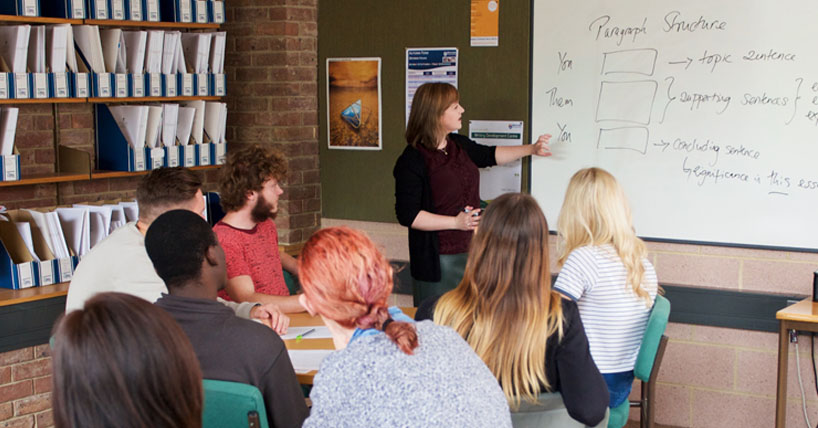How to Improve your Grammar (non-native English speakers)
As a non-native speaker of English studying at Newcastle University, you may have already dedicated a lot of time and energy to mastering English grammar. Your ultimate goal might be to try and achieve fluent written English that contains no grammatical errors. After all, presentation matters, and grammar errors can give the reader a poor impression of your work, so working towards this goal is a good idea.
However, unlike in an English language classroom, at University the most important thing isn’t the accuracy of your English, but the quality of your thinking. In the short term, then, it’s important to prioritise those issues that are going to have the biggest impact on your ability to communicate your thoughts effectively to the reader.
Here are some steps you can take to identify and prioritise which grammar issues to work on to best communicate your thinking:
Check it’s a grammar issue
Before you start, make sure that the issue really is grammar and not something else.
- Check your assumptions. As a non-native speaker, you might naturally assume that any issues in your writing are due to language difficulties. However, grammar is only one part of academic communication and feedback on your writing might concern other issues such as structure, consistency of argument or how well you’ve answered the assignment brief/ question.
- Check your feedback. Feedback might mention grammar as an issue, but your writing may actually be grammatically accurate, just unconventional in terms of academic English. Sometimes markers sense that something isn’t quite ‘right’, but may not be sure whether it’s grammar or style.
- Verify the issue. To help verify if grammar is the issue, you might want to:
- Proofread 1 or 2 sample paragraphs. Try reading aloud or covering the line underneath with a piece of paper to slow yourself down and make sure that you’re reading every word. If you can’t identify any grammar mistakes, this might indicate that the issue lies elsewhere.
- Use grammar checking software such as the one built into your word processor to identify errors. These systems aren’t perfect and are no substitute for a strong understanding of grammar, so instead of relying on them to correct grammar mistakes, try using them as tools to identify what the grammar issues are.
- Ask someone else to look over your work. This could be a peer mentor, your personal tutor, marker or one of INTO’s tutors or even a friend who is particularly good at grammar. Remember, you’re not asking them to proofread or correct your work, just give you a sense of what they think the issues are.
Identify the problem
-
The next step is to identify what type (or types) of issues are coming up and how regularly.
- Slip or Error? Check if you’ve made a slip (an accidental mistake that you can identify and correct) or an error (a repeated mistake caused by not knowing or forgetting a grammar rule). If the issue is just a slip, then you might need to work on your proofreading rather than your grammar, but if it’s a frequently repeated error then it’s probably worth revising it.
- Use Feedback. If your feedback specifies grammar issues you need to focus on, note which ones are identified and compare to see if other markers are picking up on the same thing.
- Be specific. Identify the exact nature of the problem, being as specific as possible. Focusing your learning goals rather than reviewing grammar more broadly can save you a lot of time. You could: for example browse the index page of grammar textbooks to help identify the rule(s) you need to revisit, or talk to an Academic Skills Team tutor or INTO tutor.
Decide how important the issue is
Ask yourself how much the issue impacts your ability to effectively communicate your ideas.
- Rule or preference? Some grammar rules are unbreakable, whereas others are more about personal preference. If it’s a matter of preference, then you may not need to change it at all so long as you’re consistent in your usage and abide by house rules. Or you might decide to go with your marker’s preference.
- Big impact or small? The quality of your thinking is more important than total accuracy and some grammatical errors – like having a verb agree with the wrong subject – might have a really big impact on meaning. But others – like using a semi-colon instead of a comma – might only impact the reader’s perception of your work, rather than their understanding.
To maximise your chances of communicating effectively:
- Review the basics. Generally, the more ‘fundamental’ a grammar rule is, the more likely it is to impact meaning. So those rules you learned when you started learning English (like noun-verb agreement and sentence structure) are likely to have a bigger impact than more ‘advanced’ grammar constructs you learned later on.
- Target key sentences. When reviewing your work, you might want to spend a bit of extra time checking the grammar of those parts which are most important for conveying your argument, like the introduction or topic sentences.
Allocate an appropriate amount of time
-
The next step is to think about how much time and effort you want to spend correcting the problem.
- Space it out. Rather than trying to learn everything in one big block, it can be more effective to space out your grammar revision. Setting aside a small amount of time each week, can help re-enforce grammar rules and make using them feel more natural.
- Find a balance. Studying at university involves many different learning activities like gathering and analysing data, reading relevant literature or crafting an argument. Grammar is only one part of the communication process, so try to find a balance between improving grammar and other academic tasks. Writing a list of all the things you need to do for an upcoming assignment can help place grammar revision within a wider context.
Get learning
Having identified the error and decided on its importance, it’s time to start learning the grammar:
- Identify how you like to learn. There’s no single best way to do this as it depends what kind of grammar you’re learning and how you like to learn as an individual. So try reflecting on your past experiences learning English grammar and think about which strategies worked well for you, and which ones weren’t so useful.
- Use it or lose it. It's generally more helpful to practise using the grammar rather than just reading about it. You might want to try testing yourself or doing targeted exercises that aim to re-enforce specific grammar rules, or ‘free writing’ where you try to incorporate the target grammar into a general paragraph.



